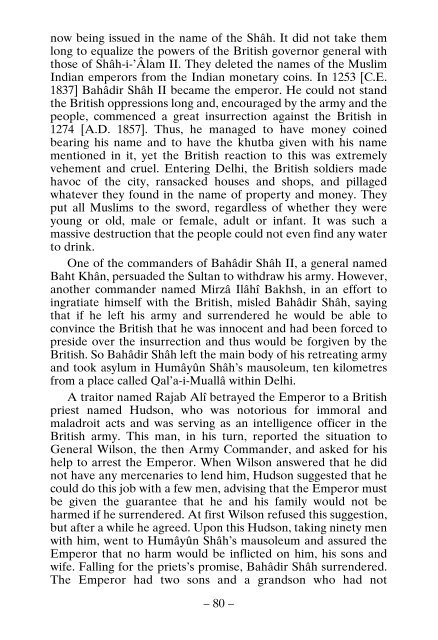Confessions Of A British Spy
Muhammad of Najd was the sort I had been looking for. For his scorn for the time’s scholars, his slighting even the (earliest) four Khalîfas, his having an independent view in understanding the Qur’ân and the Sunna were his most vulnerable points to hunt and obtain him. So different this conceited youngster was from that Ahmed Efendi who had taught me in Istanbul! That scholar, like his predecessors, was reminiscent of a mountain. No power would be able to move him. Whenever he mentioned the name of Abû Hanîfa, he would stand up, go and make an ablution. Whenever he meant to hold the book of Hadîth named he would, again, make an ablution. The Sunnîs trust this book very much. Muhammed of Najd, on the other hand, disdained Abû Hanîfa very much. He would say, “I know better than Abû Hanîfa did. In addition, according to him, half of the book of wrong.
Muhammad of Najd was the sort I had been looking for. For
his scorn for the time’s scholars, his slighting even the (earliest)
four Khalîfas, his having an independent view in understanding
the Qur’ân and the Sunna were his most vulnerable points to hunt
and obtain him. So different this conceited youngster was from
that Ahmed Efendi who had taught me in Istanbul! That scholar,
like his predecessors, was reminiscent of a mountain. No power
would be able to move him. Whenever he mentioned the name of
Abû Hanîfa, he would stand up, go and make an ablution.
Whenever he meant to hold the book of Hadîth named he would, again, make an ablution. The Sunnîs trust this book
very much.
Muhammed of Najd, on the other hand, disdained Abû Hanîfa
very much. He would say, “I know better than Abû Hanîfa did.
In addition, according to him, half of the book of wrong.
Create successful ePaper yourself
Turn your PDF publications into a flip-book with our unique Google optimized e-Paper software.
now being issued in the name of the Shâh. It did not take them<br />
long to equalize the powers of the <strong>British</strong> governor general with<br />
those of Shâh-i-’Âlam II. They deleted the names of the Muslim<br />
Indian emperors from the Indian monetary coins. In 1253 [C.E.<br />
1837] Bahâdir Shâh II became the emperor. He could not stand<br />
the <strong>British</strong> oppressions long and, encouraged by the army and the<br />
people, commenced a great insurrection against the <strong>British</strong> in<br />
1274 [A.D. 1857]. Thus, he managed to have money coined<br />
bearing his name and to have the khutba given with his name<br />
mentioned in it, yet the <strong>British</strong> reaction to this was extremely<br />
vehement and cruel. Entering Delhi, the <strong>British</strong> soldiers made<br />
havoc of the city, ransacked houses and shops, and pillaged<br />
whatever they found in the name of property and money. They<br />
put all Muslims to the sword, regardless of whether they were<br />
young or old, male or female, adult or infant. It was such a<br />
massive destruction that the people could not even find any water<br />
to drink.<br />
One of the commanders of Bahâdir Shâh II, a general named<br />
Baht Khân, persuaded the Sultan to withdraw his army. However,<br />
another commander named Mirzâ Ilâhî Bakhsh, in an effort to<br />
ingratiate himself with the <strong>British</strong>, misled Bahâdir Shâh, saying<br />
that if he left his army and surrendered he would be able to<br />
convince the <strong>British</strong> that he was innocent and had been forced to<br />
preside over the insurrection and thus would be forgiven by the<br />
<strong>British</strong>. So Bahâdir Shâh left the main body of his retreating army<br />
and took asylum in Humâyûn Shâh’s mausoleum, ten kilometres<br />
from a place called Qal’a-i-Muallâ within Delhi.<br />
A traitor named Rajab Alî betrayed the Emperor to a <strong>British</strong><br />
priest named Hudson, who was notorious for immoral and<br />
maladroit acts and was serving as an intelligence officer in the<br />
<strong>British</strong> army. This man, in his turn, reported the situation to<br />
General Wilson, the then Army Commander, and asked for his<br />
help to arrest the Emperor. When Wilson answered that he did<br />
not have any mercenaries to lend him, Hudson suggested that he<br />
could do this job with a few men, advising that the Emperor must<br />
be given the guarantee that he and his family would not be<br />
harmed if he surrendered. At first Wilson refused this suggestion,<br />
but after a while he agreed. Upon this Hudson, taking ninety men<br />
with him, went to Humâyûn Shâh’s mausoleum and assured the<br />
Emperor that no harm would be inflicted on him, his sons and<br />
wife. Falling for the priets’s promise, Bahâdir Shâh surrendered.<br />
The Emperor had two sons and a grandson who had not<br />
– 80 –


